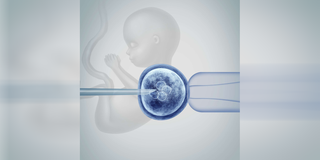Hope for cheaper pregnancy boost as KNH constructs IVF unit

In-vitro fertilisation helps women to conceive.
A new In Vitro Fertilisation (IVF) unit is set for construction at the Kenyatta National Hospital (KNH), raising hope of cheaper prices of the increasingly procedure of boosting chances of getting children.
The high of IVF has been a barrier to many couples who cannot children naturally.
“The site is located within the Kenyatta National Teaching & Referral Hospital grounds, along Ngong' Road, Nairobi County,” the hospital disclosed as it invited bidders to construct the facility.
IVF is a form of fertility treatment in which eggs are fertilised with sperm in the laboratory to create embryos. These embryos are then transferred to the womb to achieve a pregnancy and birth. This treatment may be recommended for couples with infertility due to several reasons.
There are two methods of fertilisation of eggs in the laboratory. In ‘standard IVF’ the eggs and sperm are mixed together and allowed to fertilise naturally. This is advised where there is no significant concern about sperm numbers or quality.
However, in couples where there is a sperm problem, an alternative method of fertilisation is used, called Intra-Cytoplasmic Sperm Injection (ICSI). In this technique individual sperm is selected and injected into individual mature eggs by the scientist.
The move by KNH is expected to shake up the cost of IVF in Kenya which is currently mainly conducted by private clinics.
Market rates show that it cost about Sh300,000 to Sh720,000 for an IVF procedure in Kenya. Kenyan couples, however, end up paying millions of shillings whenever the assisted conception procedure fails and they undergo more than one cycle of treatment. The cost of IVF is largely high due to expensive medicines used as part of the procedure.
The success of the IVF procedure is a combination of luck, the age of the couple, a conducive womb, hormonal imbalance, and adequate good quality eggs, and sperms.
Young women are more likely to have good-quality eggs with a higher chance of getting pregnant through IVF compared to older women.
IVF failure has been linked to an array of factors including the loose cervix, untimely transfer of the embryo, a uterus wall that is thin or unnaturally thick, and chromosome abnormalities of the egg or sperm or the embryo.
Advanced technology and screening of embryos before they are put in the womb has however helped cut the IVF failure rates, presenting a boost to Kenyan couples.
In private clinics in Nairobi, testing the embryo for abnormalities would cost Sh100,000 to Sh300,000, an additional charge to IVF, and that is dependent on whether a couple wants the embryo tested for over 600 inherited diseases or just chromosome analysis.
Another advancement in the fertility industry is the availability of donor eggs and embryos. Couples now have an option of sourcing online and importing donor sperms or eggs.
They part with an additional Sh30,000 to Sh200,000, depending on whether the sperms are imported or locally sourced.
Donor sperms in IVF are used when a male partner has no sperm in his semen or if attempts to retrieve the sperms surgically have failed.
However, before opting for donor sperms, fertility experts may use ICSI, which ranges from Sh38,000 in private hospitals, to address male fertility issues and boost fertilisation.
To reduce costs, one could freeze the extra or spare embryos for future use if the IVF cycles fail. This can reduce the cost of a repeat embryo implantation to Sh330,000 or lower depending on the centre.
In most clinics, couples have to consent beforehand to the use of the created embryos. In cases of divorce or death of one or both partners, the frozen embryos are donated to another couple, known or unknown, or to the wife or husband, depending on the legal documents signed at the clinic.





